外研版英语八年级下册Module 3导学案(3节).
2020春外研版八年级英语下册教案:Module3Unit3 Languageinuse
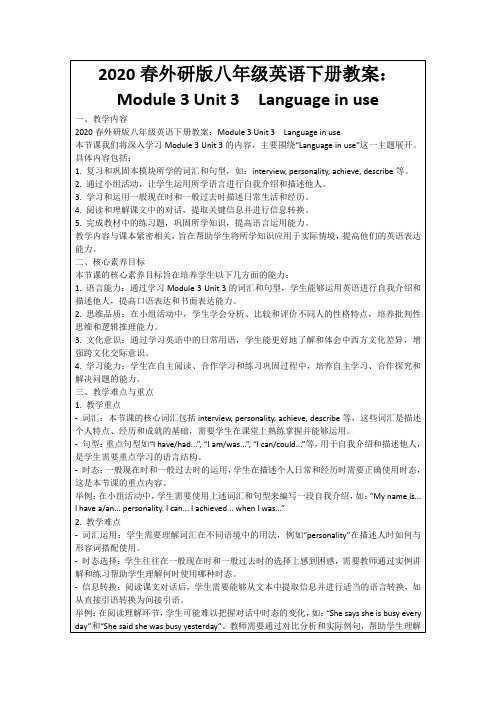
(五)总结回顾(用时5分钟)
今天的学习,我们了解了如何用英语进行自我介绍和描述他人,以及一般现在时和一般过去时的运用。同时,我们也通过实践活动和小组讨论加深了对这些知识点的理解。我希望大家能够掌握这些知识点,并在日常生活中灵活运用。最后,如果有任何疑问或不明白的地方,请随时向我提问。
在学生小组讨论环节,我尝试扮演了一个引导者的角色,发现学生们在启发式教学中的表现非常出色。他们能够主动发现问题、分析问题,并提出解决方案。这让我深感欣慰,也让我认识到激发学生思考的重要性。
最后,回顾所学内容并对学生进行提问,有助于巩固他们的记忆。但在今天的教学中,由于时间紧张,这一环节进行得较为仓促。在今后的教学中,我会合理安排时间,确保课程总结和回顾的充分进行。
1.复习和巩固本模块所学的词汇和句型,如:interview, personality, achieve, describe等。
2.通过小组活动,让学生运用所学语言进行自我介绍和描述他人。
3.学习和运用一般现在时和一般过去时描述日常生活和经历。
4.阅读和理解课文中的对话,提取关键信息并进行信息转换。
1.教学重点
-词汇:本节课的核心词汇包括interview, personality, achieve, describe等,这些词汇是描述个人特点、经历和成就的基础,需要学生在课堂上熟练掌握并能够运用。
-句型:重点句型如“I have/had...”, “I am/was...”, “I can/could...”等,用于自我介绍和描述他人,是学生需要重点学习的语言结构。
2.教学难点
-词汇运用:学生需要理解词汇在不同语境中的用法,例如“personality”在描述人时如何与形容词搭配使用。
外研社初中英语八年级下册module3 unit 3 导学案

外研社初中英语重点知识精选掌握知识点,多做练习题,基础知识很重要!外研社版初中英语和你一起共同进步学业有成!Moudle 3 Journey to spaceUint3 Language in useⅠTeaching modelRevision and applicationⅡTeaching methodFormal and interactive practiceⅢTeaching aims1. Function: Talking about recent events.2. Structure: Present perfect with already, just and yet.3. Around the world: Names of the days of the week.4. Task: Making a poster about space travel.ⅣTeaching aidsTape recorder, OHP, handoutsV Teaching StepsStep 1 revisionShow some pictures to review the text of Unit 1 and 2Step 2 Language practice1. read through the example sentences in the box with the whole class2. Ask the students to repeate the sentences in the boxStep 3 Complete the news with already, just and yet.1. Grammar: 在现在完成时的句子中,already(已经)、just(已刚刚)常用于肯定句,放在have 和has的后面,yet(还、尚、仍然)常用于否定句和疑问句,(放在have和has的后面也可在句末)。
外研版八年级下册英语module3复习导学案

外研版八年级下册英语module 3 复习导学案unit 1 导学案【复习重难点】:掌握动词的(to)+v.或v.-ing形式作宾语。
词汇复习look out of,win, newsreader,report,reporter,score,everybody,mention, prepare,goal,hate突破重点与难点1.Remember to look out for the red light. I enjoy showing visitors around.如果一个动词接在另一个动词后面,英语中这个动词常会有两种形式,一是动词不定式to do形式,另一种是v-ing 形式。
如:想写want _______,同意参加agree _________, 喜欢看电视like ___________, 喜爱踢足球enjoy__________.规律:接不定式的单词多为“打算”、“计划”、“希望”之类的动词,表示将来的动作或行为,如单词want, need, agree, hope, plan, decide等。
而v-ing 形式表示一般性的动作或行为及正在进行色动作或行为,如单词like,hate,enjoy, love,finish, practise 等。
有的动词既可以接to do也可以接v-ing,有的意思类似,如begin, start, continue;有的强调重点不同,如hear, see, notice, 如果表示正在进行的动作就跟_______, 表示经常发生或者发生过的动作就接_______; 有的意思完全不同,如stop, remember, forget等。
stop doing 意为_______, stop to do意为_______, remember to do意为_______, remember doing意为_______.顺口溜:常见的接V-ing 作宾语的动词还有:完成练习值得忙(finish,practice,be worth,be busy)继续习惯别放弃(keep on, be used to,give up)考虑建议不禁想(consider,suggest,can't help, feel like)喜欢思念要介意(enjoy,miss, mind)顺口溜:常见的接动词不定式作宾语的动词:要想拒绝忘记(want,refuse,forget)需要努力学习(need,try,learn)喜欢同意帮助(like,agree,help),希望决定开始(hope/wish,decide,begin/start)。
外研版英语八年级下Module3Unit3教案

Unit 3 Language in useLanguage practiceRead through the sentences in the box with the whole class.Ask them to decide what the highlighted parts indicate (verbs followed by -ing form or infinitive with to)1. Put the words in the correct column.Read through the verbs in the box with the whole class; if you wish, have them repeat them chorally and individually.Pay particular attention to those verbs where the stress is not on the first syllable: agree, continue, decide, enjoy, remember.Ask the students to do this individually, then check with a partner.Call back the answers from the whole class; you may wish to complete the table on the board as they give the answers.2. Complete the sentences with the correct form of the words.Ask the students to do this individually, then check with a partner.Call back the answers from the whole class as complete sentences.Answers1. seeing / to see2. listening3. to visit4. talking5. studying6. to speak7. making / to make8. getting9. to speak3. Match the beginnings with the endings. Make as many sentences as possible.Ask the students to do this individually, then check with a partner.Call back the answers from the whole class as complete sentences.Answers1. Everybody knows when she came into this room. / what they want to hear. / how long the Great Wall is. / that they won the first prize last week. / why they must be quiet. / who the most popular singer is.2. We will find out when she came into this room. / what they want to hear. / how long the Great Wall is. / why they must be quiet. / who the most popular singer is.3. Please tell me when she came into this room. / what they want to hear. / how long the Great Wall is. / that they won the first prize last week. / why they must be quiet. / who the most popular singer is.4. The listeners tell us what they want to hear. / who the most popular singer is.5. They were happy to know that they won the first prize last week.6. He asked when she came into this room.7. Did they know that he was doing at that time?8. Have you heard that he will come?4. Choose the word which does not belong in each group.Ask the students to complete this individually, then check with a partner.Call back the answers, having one student read out the list of words and another say which is the odd one out.Answers1. reporter (a person, all the others are parts of a newspaper)2. glass (a kind of material, all the others are about the weather)3. studio (all the others are about a competition)4. manager (all the others are about a newspaper)5. sunny (all the others are about columns of a newspaper)5. Complete the sentences with the correct form of the words in the box.Ask the students to do this individually, then check with a partner.Call back the answers from the whole class as complete sentences.Answers1. weather report; weather2. sunny; rain3. prepare4. latest; result5. scored; won6. sports6. Ask and answer the questions.Ask the students to do in pairs.Call back the answers from the whole class, having one student ask a question and another answer it.7. Listen and say what Kate’s job is.Read the three jobs out to the whole class.Ask them to listen to the recording once and decide which is Emma’s job.Call back the answer from the whole class.Answerb8. Listen again and choose the best answer.Ask the students to read through the questions to themselves.Play the recording once while they listen and focus.Play it again for them to answer. They can then check with a partner.Play it once more for them to complete, check and correct.Call back the answers from the whole class, having one student ask a question and another answer.Answers1. a2. c3. c4. b5. a, b, c, e9. Complete the passage with the phrases in the box.Read through the phrases in the box with the whole class, having them repeat them chorally and individually.Ask the students to do the exercise individually, then check with a partner.Call back the answers from the whole class as complete sentences.Answers1. take you around2. look out for3. would like to4. look out of5. closes down6. the end ofAround the worldRead through the box with the whole class.Ask them some questions about the information, . Why is it important the radio works on clockwork? (Because it requires no batteries or electricity)Culture box: BBC RadioThe British Broadcasting Corporation (BBC) has five national radio stations. Radio 1 plays only pop music all day and night. Radio 2 plays a mixture of light music and general interest programs. Radio 3 is the classical music program. Radio 4 is the serious channel, with a mixture of in-depth news coverage, interviews with important people and special focus documentaries. Radio 5 has sport.The BBC also has a network of local radio stations around Britain which offer a mixture of music and more local news and interest items.The BBC World Service broadcasts news and entertainment programs in English and other languages around the world.Module task: Making a school radio programActivities 10~12Read through the instructions with the whole class.Ask them to get into groups of six .Give them time to plan their program in class, and decide who is writing what (you should encourage them each to write one part of the program).Then ask them to do the writing at home.Back in class they can put the program together.If you or they have the facilities to record it, then do so. Otherwise, they can present it ‘live’ to the rest of the class.。
Module3Unit3(教案)-2022-2023学年八年级下册英语(外研版)

b.掌握一般将来时态的用法,如will be doing, will have done等;
c.阅读并理解课文,学习在旅行过程中如何与人沟通和交流;
d.提高听力技能,理解火车广播及乘客对话。
五、教学反思
在本次教学活动中,我发现学生们对火车旅行相关词汇和一般将来时态的学习表现出较高的兴趣。他们积极参与课堂讨论和角色扮演活动,这让我深感欣慰。然而,我也注意到在一些方面需要改进和调整。
首先,对于火车旅行词汇的教授,我尝试通过图片和实物展示来帮助学生理解和记忆。从学生的反馈来看,这种方法较为有效。但在接下来的教学中,我还可以尝试更多元化的教学方法,如引入歌曲、视频等元素,让词汇学习更加生动有趣。
d.口语交流:在小组活动中,学生可能存在害羞、不敢开口的现象。教师应鼓励学生积极参与,提供更多口语交流的机会。
举例:针对词汇运用难点,教师可以设计填空、造句等练习,帮助学生巩固词汇。如给出一个火车旅行场景,让学生用所学词汇填空,使其在实际语境中运用词汇。
四、教学流程
(一)导入新课(用时5分钟)
同学们,今天我们将要学习的是《Module 3 Unit 3 On the train》这一章节。在开始之前,我想先问大家一个问题:“你们有没有经历过乘坐火车旅行的经历?”这个问题与我们将要学习的内容密切相关。通过这个问题,我希望能够引起大家的兴趣和好奇心,让我们一同探索火车旅行中的英语用语和交流技巧。
其次,在语法部分,我发现部分学生对一般将来时态的理解和应用还存在一定的困难。在讲授过程中,我试图通过举例和对比来解释这一语法点,但效果并不理想。因此,我计划在下一节课中增加一些实际场景的练习,让学生在实际语境中运用这一时态,以便加深理解。
外研版八年级下Module3 Unit3教案新部编本

教师学科教案[ 20 – 20 学年度第__学期]任教学科:_____________任教年级:_____________任教老师:_____________xx市实验学校The 4th period Date: Sep.Module 3 . Unit 3 Language in useTeaching Content: Language in useKey structures: Have you… yet?I have already…I haven’t … yet.Teaching Aims and Demands:1. To summarize and consolidate the use of present perfect tense.2. To summarize and consolidate expressions and vocabulary.3.Affection and attitudes: We should love science and our country.Learning strategies: Formal instruction and task-based approach and interactive practice.Teaching Aids: Multi-Media (video, OHP, handout)Importance and difficulty: The use of prestent perfectTeaching Procedures:Part I RevisionHelp students to revise what is learnt in 3 periods of this module.Part II Language practiceTask1: To summarize and consolidate the usage of present perfect tense.(1).Run through the examples with the Ss. and make sure that they are familiar with the use of present perfect tense.(2). Ask the Ss. to repeat the sentences in the box.(3). Ask“Can you make other similar examples?”(4).Focus the Ss’s attention on the ways in which they are used:Task2: To summarize and consolidate the use of present perfect tense.(1). Do activities 1and 2 on page 22.(2). Ask the Ss. to call out the answers from the whole class.(3). Ask the Ss. to read the complete sentences.(4). Then do activities 3 and 4 and 5 on page 23. Then role-play the conversation in Activity 5.(5) Summarize: the formation of the present perfect tense.Task 3: Complete the passage with the words in the box in Activity 7.(1)Ask the Ss. to complete the passage with the words in the box.(2)Exchange work and peer correct with another pair for accuracy.(3)Call the answers back from the class.Task 4: Listen to this interview and choose the correct answers in Activity 7.(1)Ask the Ss. to listen to the interview and choose the correct answers(2)Exchange work and peer correct with their deskmate for accuracy.(3)Call the answers back from the class as complete sentences.Task 5: Add the words and expressions to the word map in Activity 9.Directions:(1)Ask the Ss. to look at the word map and add the words and expressions to it.(2)Exchange work and peer correct with their deskmates for accuracy.(3)Call the answers back from the class.Part IV: A testDo Ex 2 on page 120 i n the WB. Let’s see who can finish it as soon as possible. Homework:Finish all the exercises in the WB.Blackboard Activities:Postscript:。
英语:Module3 Unit3复习导学案(外研社八年级下)

Module 3 On the radioUnit 3 Language in use学习目标1. 复习1、2模块的单词、短语和句型。
2. 语法:能够了解六种句子的结构。
一、复习词汇(一)1. 小心____ 2.赢,获胜_____ 过去式____过去分词_____ 3. 新闻播报员____________4.报道_______5.新闻记者______ 6.成绩;分数__________7.每个人__________ 8.提及________ 9.不客气_______10准备________11.(进球得分)___________ 12.憎恨____________(二)1. 解释;说明________ 2.声音_______ 3.向下看_______ 4. 看起来,似乎__________5.停止播音;关闭______________ 6.要……_______ 7.每周的;周刊_______8.收听者,听众______ 9.文章_______10. 麦克风_______11.玻璃;玻璃杯_________12.声音;听起来____________ 13. 检查二、动词不定式(to + v.)与动名词(v.-ing )作宾语(一)跟动词不定式作宾语的动词有:1. want to do sth. 想做某事2. would like to do sth. 想、愿意做某事3. hope to do sth. 希望做某事4. wish to do sth. 希望做某事5. plan to do sth. 计划做某事6. need to do sth. 需要做某事7. decide to do sth. 决定做某事8. agree to do sth. .同意做某事(二)必须跟v.-ing形式作宾语做宾语的情况:1. enjoy doing sth. 喜欢做某事2. finish doing sth. 完成做某事3. practise doing sth. 练习做某事4. keep doing sth. 一直做某事5. imagine doing sth.(三)既可以跟动词不定式又可以跟v.-ing形式的词:1. stop to do sth. 停下来去做某事stop doing sth.停止做某事2. forget to do sth. 忘了去做某事forget doing sth.做过某事而忘了3. remember to do记得去做某事remember doing sth.记得做过某事4. like to do sth.喜欢去做某事like doing sth.平时喜欢做某事5 . try to do sth.努力做某事try doing sth.试着做某事6. begin to do /doing sth.开始做某事7. start to do/ doing sth. 开始做某事8. continue to do / doing sth.继续做某事9. hate to do /doing sth. 憎恨做某事三、强化训练一、单项选择1. --Bob, it is getting cold , ____ take a jacket with you ?--All right, Daddy.A. why notB. What aboutC. would you likeD. You’d better2. Students look forward to _____ this Saturday.A. go campingB. go to campC. going campingD. going camp3. -Thank you for helping me carry the heavy box.- ______.A. No, no, noB. That’s rightC. Don’t say soD. Don’t mention it4. My brother decided ____ with me tonight.A. stay at homeB. to stay at homeC. staying at homeD. stays at home5. Miss Ye taught me ____do homework.A. how toB. what toC. how could ID. how I can6. He keeps ____ exercise every morning to keep healthyA. doB. to doC.doesD. doing7. I hate ____ hamburgers. They make me feel sick.A. eatingB. eatenC. eatD. to do8. Please __ the radio. I want to listen to Radio Beijing in English.A. turn offB. turn downC. turn onD. turn up9. He is driving ____ of the car.A. in frontB. in the front ofC. in front ofD. at front10. I’m very tired. Let’s stop _____ and have a rest.A. to walkB. walkingC. walkD. walking二、用动词的适当的形式完成句子1. Tell the boys _______ (not play) the computer games.2. Have you finished _______ (clean) the classroom?3. Y ou need _______ (speak) English to work on radio.4. His mother agreed ______ (buy) a new coat for him the day before yesterday.5. Y ou should keep practising _______ (speak) English.6. I would like _______ (see) him tomorrow.7. I would like _______ (see) him tomorrow.8. Don’t you remember _______ (see) the man before.9. Y ou must remember _______ (leave) tomorrow.10. Y ou must try _______ (be) more careful.11. Let’s try ______ (do) the work in another way.三、根据汉语意思完成句子1. 我妈妈同意我去看电影。
外研版八年级下module3教案
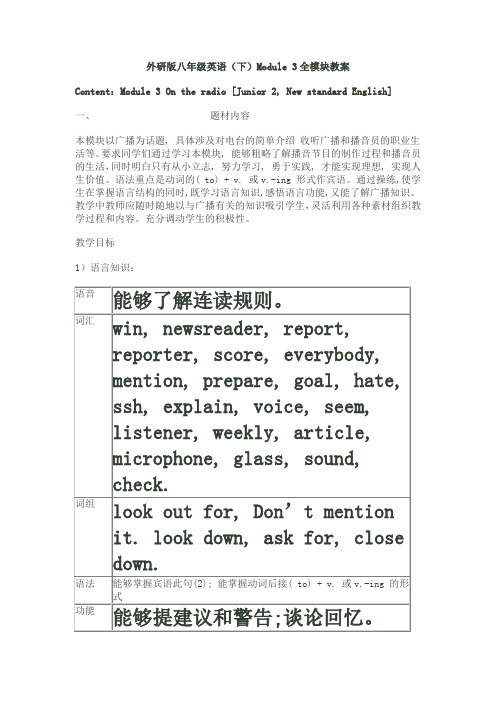
外研版八年级英语(下)Module 3全模块教案Content:Module 3 On the radio [Junior 2, New standard English]一、题材内容本模块以广播为话题, 具体涉及对电台的简单介绍收听广播和播音员的职业生活等。
要求同学们通过学习本模块, 能够粗略了解播音节目的制作过程和播音员的生活,同时明白只有从小立志, 努力学习, 勇于实践, 才能实现理想, 实现人生价值。
语法重点是动词的( to) + v. 或v.-ing 形式作宾语。
通过操练,使学生在掌握语言结构的同时,既学习语言知识,感悟语言功能,又能了解广播知识。
教学中教师应随时随地以与广播有关的知识吸引学生,灵活利用各种素材组织教学过程和内容。
充分调动学生的积极性。
教学目标1)语言知识:2)语言技能:3)学习策略4)文化意识:5)情感态度:培养和强化学习兴趣, 参加各种英语活动,锻炼克服困难的意志,通过不断努力,实现理想。
6)任务:做一期校内广播节目。
教学重点和难点重点:1.通过了解广播知识训练学生的听、说、读、写能力,掌握宾语此句(2); 能掌握动词后接( to) + v. 或v.-ing 的形式的用法。
难点:进一步掌握动词后接( to) + v. 或v.-ing 的形式的用法。
教学方法基于课程改革的理念及“第二语言习得论”,培养实现人的可持续发展和人的主体精神的自我完善和发展所必需的能力和素质,运用任务型教学途径,围绕核心任务,设定小任务,开展和谐愉悦的课堂活动,强调兴趣第一的原则,初步设计“P—T—P”自主学习立体模式:pre-task…task-cycle…post-task。
二、教材处理核心任务:能够收集有关资料,运用所学知识做一期校内广播节目。
三个环节如下:pre-task:学生联系生活实际,激活背景知识,。
task –cycle:通过整个模块的听说读写的训练,强化介绍广播知识的表达能力,为完成任务做好铺垫post-task:达成任务,展示成果,反馈学习情况三、教材安排根据学生学习英语的特点和规律,我们把本模块划分为4课时:Period 1: Listening and Vocabulary &Pronunciation and SpeakingPeriod 2: Reading and VocabularyPeriod 3: Writing& Around the world &Module TaskPeriod 4: Language in use注:教学时应根据学生的学习水平、生活实际水平、接受程度及课堂出现的临时状况进行运用、调整及筛选。
外研八年级下册:模块八 第三单元导学案(无答案)

Module8 Time off【主备人】【从备人】【学习内容】Unit3 Language in use.【课型】Revision【备课日期】【上课日期】【二次备课审批人】【学习目标】1. 提高综合运用语言的能力。
2. 了解英国湖区国家公园。
3. 会运用that所引导的宾语从句。
【教学准备】Tape recorder, multi-media【学习过程】题组训练一(词汇训练)(10minutes)一、用适当的单词填空。
1. I can ______ believe we’re in the city centre.2. I don’t think they _____ people to swim in the lak e.3. We thought _________ was moving about.4. Lingling’s uncle said that it was wrong to ____ leaves ____ plants and that we should protect everything here.二、完成句子。
1.去年暑假我和妈妈一起去旅游了。
Last summer holiday I ______ ______ ______ ______ with my mother2.让我们一起去游泳吧。
Let’s _______ _______.3.他太累了,很快睡着了。
He was so tired that he _______ _______ soon.4.我希望能交许多新朋友。
I hope I can ______ lots of ________ _________.5.那个农场位于城市的北部。
The farm is _____ _____ _____ _____ the city.方法是: 独立完成后小组核对答案并讲清原因,叫一列同学起来展示。
目的是:考查学生对重点句型和词汇的掌握程度。
外研版八年级英语下册第3模块学案M3U3
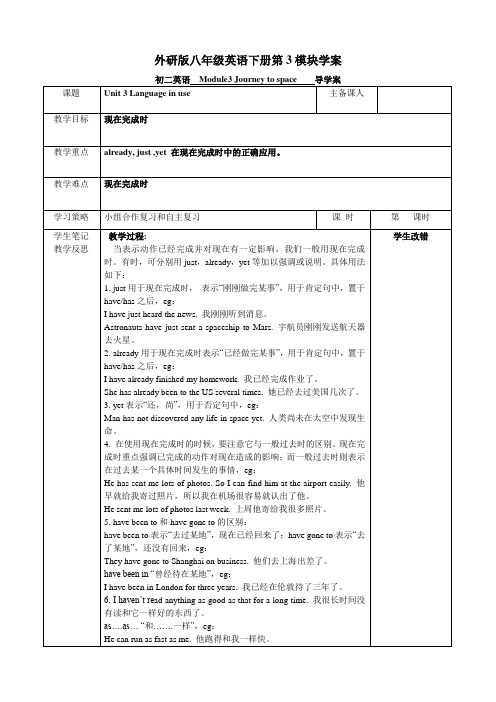
外研版八年级英语下册第3模块学案初二英语Module3 Journey to space 导学案课题Unit 3 Language in use 主备课人教学目标现在完成时教学重点already, just ,yet 在现在完成时中的正确应用。
教学难点现在完成时学习策略小组合作复习和自主复习课时第课时学生笔记教学反思教学过程:当表示动作已经完成并对现在有一定影响,我们一般用现在完成时。
有时,可分别用just,already,yet等加以强调或说明。
具体用法如下:1. just用于现在完成时,表示“刚刚做完某事”,用于肯定句中,置于have/has之后,eg:I have just heard the news. 我刚刚听到消息。
Astronauts have just sent a spaceship to Mars. 宇航员刚刚发送航天器去火星。
2. already用于现在完成时表示“已经做完某事”,用于肯定句中,置于have/has之后,eg:I have already finished my homework. 我已经完成作业了。
She has already been to the US several times. 她已经去过美国几次了。
3. yet表示“还,尚”,用于否定句中,eg:Man has not discovered any life in space yet. 人类尚未在太空中发现生命。
4. 在使用现在完成时的时候,要注意它与一般过去时的区别。
现在完成时重点强调已完成的动作对现在造成的影响;而一般过去时则表示在过去某一个具体时间发生的事情,eg:He has sent me lots of photos. So I can find him at the airport easily. 他早就给我寄过照片,所以我在机场很容易就认出了他。
He sent me lots of photos last week. 上周他寄给我很多照片。
外研版八年级英语下册Module 3 Unit 3导学案设计(无答案)
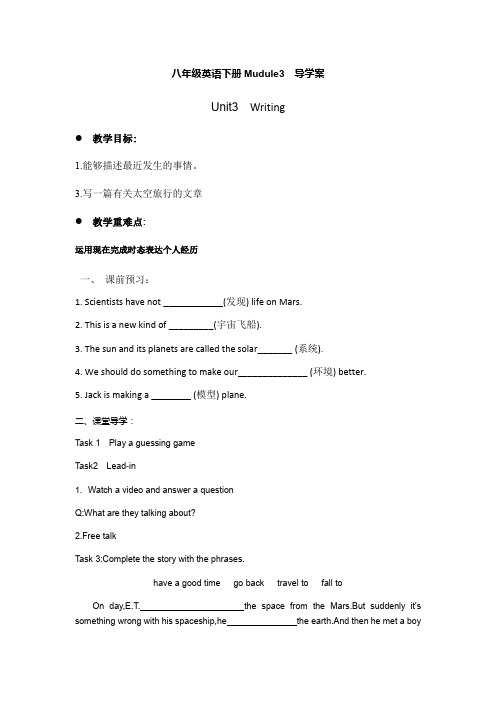
八年级英语下册Mudule3 导学案Unit3 Writing●教学目标:1.能够描述最近发生的事情。
3.写一篇有关太空旅行的文章●教学重难点:运用现在完成时态表达个人经历一、课前预习:1. Scientists have not ____________(发现) life on Mars.2. This is a new kind of _________(宇宙飞船).3. The sun and its planets are called the solar_______ (系统).4. We should do something to make our______________ (环境) better.5. Jack is making a ________ (模型) plane.二、课堂导学:Task 1 Play a guessing gameTask2 Lead-in1. Watch a video and answer a questionQ:What are they talking about?2.Free talkTask 3:Complete the story with the phrases.have a good time go back travel to fall toOn day,E.T. the space from the Mars.But suddenly it's something wrong with his spaceship,he the earth.And then he met a boycalled Jim.Jim was kindness and hospitality(好客).E.T. on the earth with Jim some days.Some days later,he to the Mars.Task4:Read the letter and then answer the questions.Dear Jim,How are you going?I felt very happy when I met you in June 1982. Thanks for your kindness and hospitality. The life on the earth is colorful. I have tasted sweet chocolate and delicious meals. I have found that people was busy with their work and housework every day. The students have to go to school to take their exams and have lessons. How tired they are! Our life is so different from yours that I want to invite you to come to the Mars. It will be wonderful.Hope to see you soon.Yours,E.T.Q1:What did E.T. think of the life on the Earth?Q2:What was people busy with every day on the earth?Q3:Is the life of the Earth the same as the Mars'?Task5:Post-writing假如现在是2050,你是地球人Jim,你的朋友E.T.生活在火星上,他邀请你去火星旅行。
外研版八年级英语下册第3模块学案M3U3
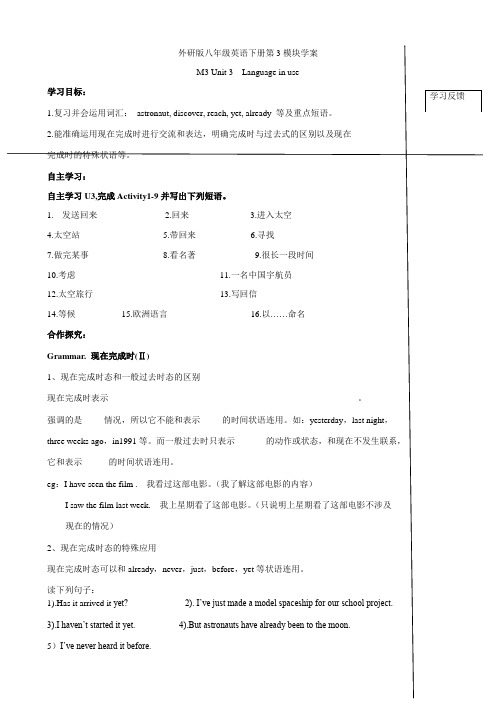
比较总结:现在完成时态可以和_________,___________,___________,_________和__________等状语连用.already表示“已经”,用于_________(肯定/否定)句,放在句中,助动词have/has之_______(前/后),过去分词之(前/后)。
just 表示“刚刚”,用于________ 句,放在句 ________。
yet 表示,“尚,未”,用于_______和_______句,放在句________ 。
巩固练习:一、句型转换I see the space station on TV.(按要求改写句子)1、________________________ (一般过去时,last night)2、________________________ (一般疑问句,last night)3、________________________ (现在完成时,just)4、________________________ (现在完成时否定句,yet)have/ has been in 意为____________,并且常和表示____________ 的时间状语连用。
用have/has been/ gone (to) 填空1. A spaceship _____________ Mars. It is coming back to earth next year.2.Lots of astronauts ________________ to the space station. They found it very interesting.3.–Where _______ you __________? –I _________________ the library.4.–Is Mr Smith at home? --No, he ____________________ town.达标检测:短文填空Today many people like reading stories about UFOs. In many countries,people are(1)UFOs.But what are UFOs?There are some different ideas about UFOs. (2) those saying, the most popular one is that they carry visitors coming from other stars. They seem to fly much faster than planes.Some UFO (3) and many other people(4) these ideas. Some people said that they saw a few UFOs land on the (5) . Some people said they saw some strange visitors coming out of the UFOs. Some even said they were carried away in the UFOs, and then weresent (6) by the strange visitors.Some people made (7) when they said they had seen UFOs. (8) theysaw a weather balloon or an uncommon plane. sometimes they saw the light from the moon.But there are a lot of things we can`t understand. Now, people still can`t understand UFOs (9). It may (10) many years to find a clear answer and then people will give UFOs another name.语法归纳:反思:。
八年级英语下册《Module 3 Journey to space》导学案(新版)外研版
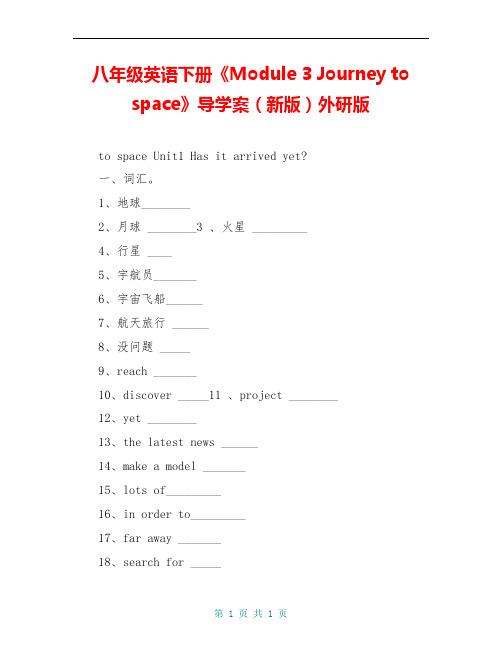
八年级英语下册《Module 3 Journey to space》导学案(新版)外研版to space Unit1 Has it arrived yet?一、词汇。
1、地球________2、月球 ________3 、火星 _________4、行星 ____5、宇航员_______6、宇宙飞船______7、航天旅行 ______8、没问题 _____9、reach _______10、discover _____11 、project ________12、yet ________13、the latest news ______14、make a model _______15、lots of_________16、in order to_________17、far away _______18、search for _____二、语言点。
1、Has it arrived yet?A、 arrive in/ at get to reach (1)你们必须在天黑前赶到那座大桥。
You must ______ at the big bridge before dark、 =You must _______ to the big bridge before dark、=You must _______ the big bridge before dark、(2)我们是昨晚到达这里的。
We ______\_______\________ here last night、B、 yet already(1)I have __________ called the police、(2)Have you finished your homework ___________?2、 What are you up to?be up to sth be up to sb(1)她在捣什么鬼?What _____ she _____ _____? (2)杰克一直在忙于玩电脑游戏。
外研八年级下册模块三第三单元导学案
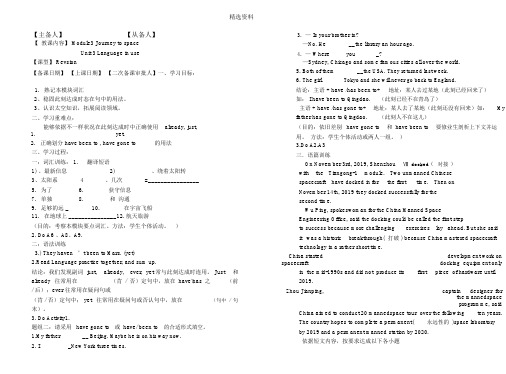
精选资料【主备人】【从备人】【教课内容】 Module3 Journey to spaceUnit 3 Language in use【课型】 Revsion【备课日期】【上课日期】【二次备课审批人】一、学习目标:1.熟记本模块词汇2、稳固此刻达成时态在句中的用法。
3、认识太空知识,拓展阅读领域。
二、学习重难点:1. 能够依据不一样状况在此刻达成时中正确使用 already, just,yet.2. 正确划分 have been to , have gone to 的用法三、学习过程:一:词汇训练: 1. 翻译短语1) 、最新信息2) 、绕着太阳转3、太阳系 4 、几次=________________5. 为了6. 获守信息7. 单独8. 和沟通9. 足够的远 _ 10. 在宇宙飞船11.在地球上 _______________12. 航天旅游(目的:考察本模块要点词汇。
方法:学生个体活动。
)2. Do A6 、A8、A9.二:语法训练3.) They haven’t been to Mars. (yet)2.Read Language practice together, and sum up.结论:我们发现副词 just, already, ever, yet 常与此刻达成时连用。
Just和already往常用在(肯/否)定句中,放在have\has之(前/后);ever 往常用在疑问句或(肯 / 否)定句中; yet往常用在疑问句或否认句中,放在(句中/句末)。
3. Do Activity1.题组二:请采用have gone to或have/ been to的合适形式填空。
1.My father__ Beijing. Maybe he is on his way now.2. I_New York three times.3. — Is your brother in?—No. He __the library an hour ago.4. — Where you _?—Sydney, Chicago and some famous cities all over the world.5. Both of them__the USA. They returned last week.6. The girl Tokyo and she will never go back to England.结论:主语 + have /has been to+地址:某人去过某地(此刻已经回来了)如: I have been to Qingdao.(此刻已经不在青岛了)主语 + have /has gone to+地址:某人去了某地(此刻还没有回来)如:My father has gone to Qingdao.(此刻人不在这儿)(目的:依旧差别have gone to和have been to要修业生剖析上下文并运用。
【2019最新】精选八年级英语下册Module3JourneytospaceUnit3Languageinuse导学案无答案新版外研版
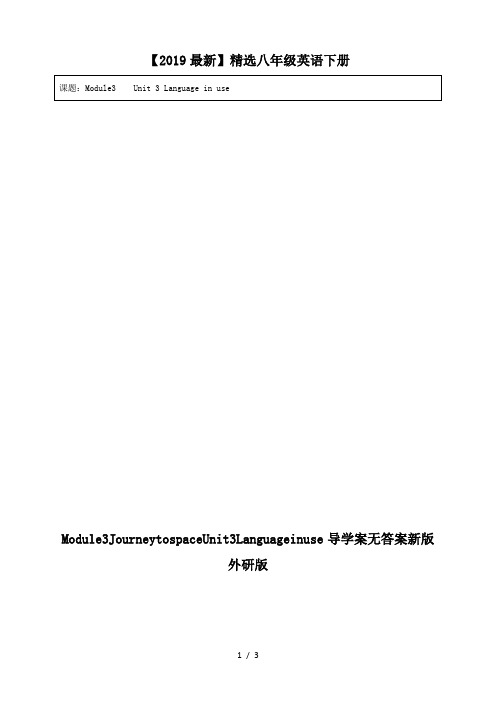
How large is the universe?It is impossible to imagine
2.宇航员们已经去过了月球______________________________________________
3.它已经到了吗?__________________________________________________________
4.我们还没有在其他行星上发现生命。_________________________________________
4.Have you _____ been to Shanghai?
5. I have _____ be en there , so I want to go there.
学习重点
能够掌握现在完成时的基本用法,以及already, just或yet的用法。
学习难点
能够用现在完成时描述自己以及他人的经历等。
16)在地球上on the earth 17)数百万的millions of
18)围绕...转go around 19)...中没有一个none of…
20)太阳系solar system 21)...中的一小部分a small part f…
22)一群a group of 23)数十亿的millions of
24)在宇宙中in the universe
25)做某事是不可能的It is impossible to do sth.
26)足够远far enough
27)与某人联系;与某人交流communicate with sb.
28)那他们在火星上发现生命了?
So have they discovered life on mars?
外研社初中英语八年级下册Module 3导学案(铁营)

外研社初中英语重点知识精选掌握知识点,多做练习题,基础知识很重要!外研社版初中英语和你一起共同进步学业有成!外研版八年级英语下册导学案Module 3 Journey to spaceUnit 1 Has it arrived yet?铁营中学郭素珍一.学习目标:1. 熟记本单元所学的新单词,短语及日常用语,并能准确运用2. 掌握含有already, just, yet现在完成时现在完成时句型二.教学重难点1.重点句子:I’ve just made a model spaceship.Has it arrived yet?Astronauts have already been to the moon.2.难点:现在完成时的应用。
三.学习步骤:1课前延伸:[课前朗读] :根据音标读出单词并了解汉语意思,养成学生自主学习词汇的习惯,促使学生迅速进入学习状态。
2、课内探究:(一),Listening1. Listen and number the words as you hear them.earth land messagemoon news planetreach scientist2. Listen again and complete the notes.● news about the trip to (1) _________● journey of (2) _________ months● has not sent back any (3) _________ yet● hope to fi nd (4) _______ on Mars3. Listen to the conversation and check the true sentences.( ) 1. Daming has just ceship for the school project.( ) 2. The spaceship to Mars has arrived.( ) 3. No one has been to the moon.( ) 4. There aren’t any astronauts in the spaceship to Mars .( ) 5. They have discovered life on Mars.(二). Reading1. Now read the conversation and answer the questions.1). What school project have Daming and Tony got?2). How does Daming feel about the school project?3). What news has Tony heard?4). Has anyone been to Mars? Why?2. complete the passage with the correct form of the words in the box. On today’s news, Tony has heard that scientists have (1) ____ a spaceship to Mars and it has (2) _______ on the (3) _____ after a journey of several months from the earth. Scientists have not (4) _________ life on Mars (5) ___. And no astronaut has ever been to Mars because it is very far away.(三)、Language points:What are you up to?你在忙什么?(Unit1)be up to 意为“忙于,从事,正在做”,常用于口语中翻译:我最近没见你,忙什么呢?I haven’t seen you these days recently, ___________________.So they have discovered life on Mars?那么他们在火星上发现生命了吗?(Unit1)discover为及物动词,意为“____________”辨析:discover/ find/ inventdiscover表示“偶然”或“经过努力”发现客观存在的事物、真理或错误。
外研版八年级英语下册导学案 Module 3 导学案(三个单元).
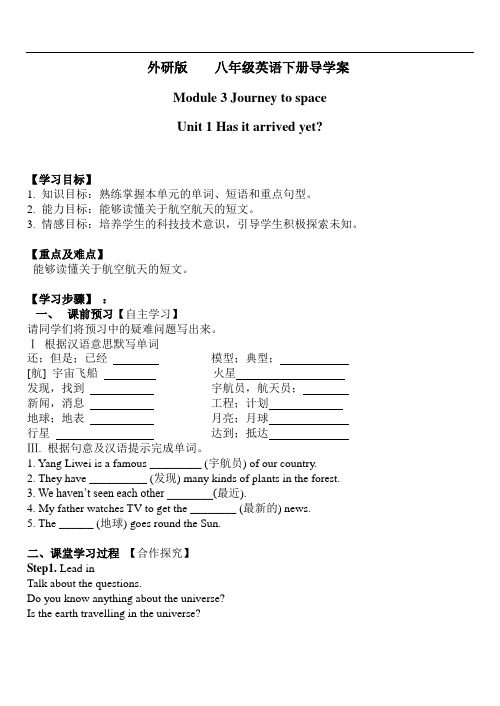
外研版八年级英语下册导学案Module 3 Journey to spaceUnit 1 Has it arrived yet?【学习目标】1. 知识目标:熟练掌握本单元的单词、短语和重点句型。
2. 能力目标:能够读懂关于航空航天的短文。
3. 情感目标:培养学生的科技技术意识,引导学生积极探索未知。
【重点及难点】能够读懂关于航空航天的短文。
【学习步骤】:一、课前预习【自主学习】请同学们将预习中的疑难问题写出来。
Ⅰ根据汉语意思默写单词还;但是;已经模型;典型;[航] 宇宙飞船火星发现,找到宇航员,航天员;新闻,消息工程;计划地球;地表月亮;月球行星达到;抵达Ⅲ. 根据句意及汉语提示完成单词。
1. Yang Liwei is a famous _________ (宇航员) of our country.2. They have __________ (发现) many kinds of plants in the forest.3. We haven’t seen each other ________(最近).4. My father watches TV to get the ________ (最新的) news.5. The ______ (地球) goes round the Sun.二、课堂学习过程【合作探究】Step1. Lead inTalk about the questions.Do you know anything about the universe?Is the earth travelling in the universe?Step2.Listen and number the words as you hear them.earth land message moon news planetreach scientistStep3.Listen again and complete the notes.● news about the trip to (1) _________● journey of (2) _________ months● has not sent ba ck any (3) _________ yet● hope to find (4) _______ on MarsS tep4. Watch,read the dialogue and do the exercises.1. Tony has just made a model of the _______.A. space stationB. spaceshipC. rocket2. ______ hasn’t started his homework yet.A. TonyB. DamingC. Jenny3. Some scientists have sent a spaceship to _______.A. the moonB. the sunC. Mars4. It has taken _______ to get to Mars.A. two monthsB. several daysC. several months5. The astronauts ______ life on Mars.A. haven’t discoveredB. have discoveredC. have seen6. There aren’t any astronauts in the ____to Mars.A. spaceshipB. planeC. space stationStep5. Read the dialogue and answer the questions:1.What school project has Daming and Tony got?2.How does Daming feel about the school project?3.What news has Tony heard?4. Has anyone been to Mars? Why?5. Who has been to Mars?Step6. Read again and complete the passage with the correct form of the words in the box.In t oday’s news, Tony has heard that scientists have a spaceship to Mars and it has on the after a journey of several months from the earth. Scientists have not life on Mars And no astronaut has ever been to Mars because it is far away.Step7. Check the true sentences.(T or F)( ) 1.The spacecraft has reached Mars.( ) 2. It has landed.( ) 3. It has already sent messages back to Earth.( ) 4. They have found life on the moon.( ) 5. They have found life on MarsStep8.Work in pairs and tell your partner about…1 …something you’ve borrowed this week.2 …something you’ve done recently.3 …a model of something you have seen.4 …something scientists have discovered.Example:A: What have you borrowed recently?B: I have borrowed a story book from the school library.Step9.Listen and underline the words the speaker stresses.1. I’ve just made a model spaceship for our school project.2. I haven’t started yet because I’m not sure how to make it.3. Has it arrived yet?4. Astronauts have already been to the moon.Now listen again and repeat.Step10.Make lists of what we have and have not done in space travel.We have_____________________________________________________________________________ _______________________________________________We have not…___________________________________________________________________________________________________【知识结构】(一)、What are you up to? 你在做什么呢?●up to 表示“正在干,从事着”。
外研社英语八年级下册第三模块导学案
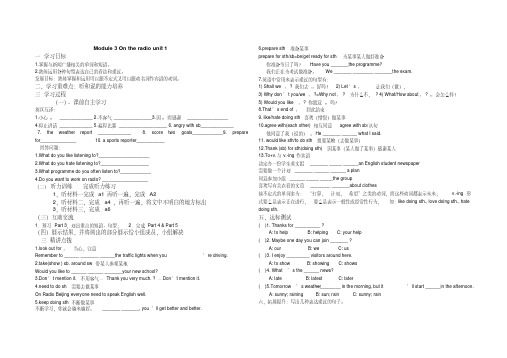
3.What programme do you often listen to?____________
4.Do you want to work on radio? __________________
(二) 听力训练 完成听力练习
1,听材料一完成 a1 再听一遍,完成 A2 2,听材料二,完成 a4 ,再听一遍,将文中不明白的地方标出 3,听材料三,完成 a6 (三)互助交流
7.英语中常用来表示建议的句型有:
1) Shall we , ? 我们去 ,, 好吗? 2) Let ’ s ,
让我们(做),
3) Why don ’ t you/we , ?=Why not , ? 为什么不, ? 4) What/How about , ? ,, 会怎么样? 5) Would you like , ? 你愿意 ,, 吗?
作 宾
等动。词 + to do/doing
语 a. 意义区分不大: begin, start, like, love, hate, prefer,等。
二,学习重难点 to do 与 doing
b. 意义不同: remember, forget, stop, try, meann, eed, 等。
三,学习过程
8.That’ s end of , 到此结束
9. like/hate doing sth 喜欢(憎恨)做某事
10.agree with(each other) 相互同意 agree with sb/ 从句
他同意了我(说的) 。 He _______ ______ what I said.
11. would like sth/to do sth 想要某物(去做某事)
Module3JourneytospaceUnit3Languageinuse导学案
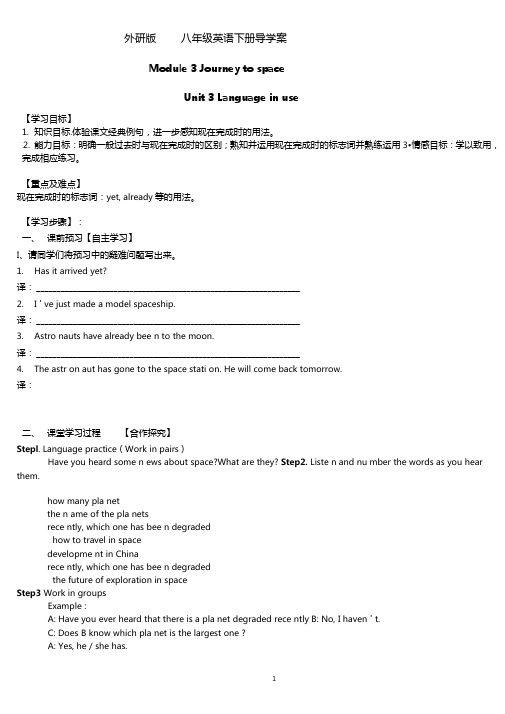
外研版八年级英语下册导学案Module 3 Journey to spaceUnit 3 Language in use【学习目标】1.知识目标.体验课文经典例句,进一步感知现在完成时的用法。
2.能力目标:明确一般过去时与现在完成时的区别;熟知并运用现在完成时的标志词并熟练运用3•情感目标:学以致用,完成相应练习。
【重点及难点】现在完成时的标志词:yet, already等的用法。
【学习步骤】:一、课前预习【自主学习】I、请同学们将预习中的疑难问题写出来。
1.Has it arrived yet?译: _________________________________________________________________2.I ' ve just made a model spaceship.译: _________________________________________________________________3.Astro nauts have already bee n to the moon.译: _________________________________________________________________4.The astr on aut has gone to the space stati on. He will come back tomorrow.译:二、课堂学习过程【合作探究】Stepl. Language practice ( Work in pairs )Have you heard some n ews about space?What are they? Step2. Liste n and nu mber the words as you hear them.how many pla netthe n ame of the pla netsrece ntly, which one has bee n degradedhow to travel in spacedevelopme nt in Chinarece ntly, which one has bee n degradedthe future of exploration in spaceStep3 Work in groupsExample :A: Have you ever heard that there is a pla net degraded rece ntly B: No, I haven ' t.C: Does B know which pla net is the largest one ?A: Yes, he / she has.Step4.【自主学习】【语法全解】1.现在完成时和一般过去时的区别:现在完成时表示过去发生的某一动作对现在造成的影响或结果,强调现在的情况,与现在密切相关不能和表示过去的时间状语连用。
- 1、下载文档前请自行甄别文档内容的完整性,平台不提供额外的编辑、内容补充、找答案等附加服务。
- 2、"仅部分预览"的文档,不可在线预览部分如存在完整性等问题,可反馈申请退款(可完整预览的文档不适用该条件!)。
- 3、如文档侵犯您的权益,请联系客服反馈,我们会尽快为您处理(人工客服工作时间:9:00-18:30)。
外研版八年级英语下册导学案Module 3 Journey to spaceUnit 1 Has it arrived yet?【学习目标】1. 知识目标:熟练掌握本单元的单词、短语和重点句型。
2. 能力目标:能够读懂关于航空航天的短文。
3. 情感目标:培养学生的科技技术意识,引导学生积极探索未知。
【重点及难点】能够读懂关于航空航天的短文。
【学习步骤】:一、课前预习【自主学习】请同学们将预习中的疑难问题写出来。
Ⅰ根据汉语意思默写单词还;但是;已经模型;典型;[航] 宇宙飞船火星发现,找到宇航员,航天员;新闻,消息工程;计划地球;地表月亮;月球行星达到;抵达Ⅲ. 根据句意及汉语提示完成单词。
1. Yang Liwei is a famous _________ (宇航员) of our country.2. They have __________ (发现) many kinds of plants in the forest.3. We haven’t seen each other ________(最近).4. My father watches TV to get the ________ (最新的) news.5. The ______ (地球) goes round the Sun.二、课堂学习过程【合作探究】Step1. Lead inTalk about the questions.Do you know anything about the universe?Is the earth travelling in the universe?Step2.Listen and number the words as you hear them.earth land message moon news planetreach scientistStep3.Listen again and complete the notes.● news about the trip to (1) _________● journey of (2) _________ months● has not sent b ack any (3) _________ yet● hope to find (4) _______ on MarsS tep4. Watch,read the dialogue and do the exercises.1. Tony has just made a model of the _______.A. space stationB. spaceshipC. rocket2. ______ hasn’t started his homework yet.A. TonyB. DamingC. Jenny3. Some scientists have sent a spaceship to _______.A. the moonB. the sunC. Mars4. It has taken _______ to get to Mars.A. two monthsB. several daysC. several months5. The astronauts ______ life on Mars.A. haven’t discoveredB. have discoveredC. have seen6. There aren’t any astronauts in the ____to Mars.A. spaceshipB. planeC. space stationStep5. Read the dialogue and answer the questions:1.What school project has Daming and Tony got?2.How does Daming feel about the school project?3.What news has Tony heard?4. Has anyone been to Mars? Why?5. Who has been to Mars?Step6. Read again and complete the passage with the correct form of the words in the box.In today’s news, Tony has heard that scientists have a spaceship to Mars and it has on the after a journey of several months from the earth. Scientists have not life on Mars And no astronaut has ever been to Mars because it is far away.Step7. Check the true sentences.(T or F)( ) 1.The spacecraft has reached Mars.( ) 2. It has landed.( ) 3. It has already sent messages back to Earth.( ) 4. They have found life on the moon.( ) 5. They have found life on MarsStep8.Work in pairs and tell your partner about…1 …something you’ve borrowed this week.2 …something you’ve done recently.3 …a model of something you have seen.4 …something scientists have discovered.Example:A: What have you borrowed recently?B: I have borrowed a story book from the school library.Step9.Listen and underline the words the speaker stresses.1. I’ve just made a model spaceship for our school project.2. I haven’t started yet because I’m not sure how to make it.3. Has it arrived yet?4. Astronauts have already been to the moon.Now listen again and repeat.Step10.Make lists of what we have and have not done in space travel.We have_____________________________________________________________________________ _______________________________________________We have not…___________________________________________________________________________________________________【知识结构】(一)、What are you up to? 你在做什么呢?●up to 表示“正在干,从事着”。
常用在非正式常合中。
e.g. What’s he up to wit h all those books on the floor?What were you up to yesterday? You didn’t answer my phone.(二)、I’ve just made this model of the space station。
这是我刚做的宇宙空间站的模型。
● just常用在现在完成时的肯定句中,常放在助动词have/has后面。
e.g. We’ve just watched the film. 我们刚看了电影。
(三). I haven’t started it yet. 我还没有开始做呢。
●yet表示“还(末)”,常用在现在完成时的否定句中,通常放在句末。
e.g. We haven’t finished our homework yet. 我们还没有完成作业。
(四). Have you heard the latest news? 你听说过这个最新消息吗?● latest adj.最近的;最新的e.g. The news is all about the latest meeting. 这条消息是关于最近的会议的。
(五). That’s why it’s on the news. 这就是它为什么出现在新闻报导的原因。
● That’s why… 这就是为什么……e.g. That’s why they didn’t like the music. 这就是为什么他们不喜欢这个音乐。
● on prep. 在(播放)中;关于……e.g. What’s on the TV? 电视正在播放什么节目?(六)So have they discovered life on Mars? 所以他们在火星上发现生命了吗?●discover v.发现;找到e.g. The fact is that he did not discover it. 事实是他没有发现它。
(七). Astronauts have already been to the moon. 宇航员已经去过月球了。
●already表示“已经”,常放在have/ has之后,通常用于肯定句中。
e.g. Jack has already finished his homework.● just/already/yet用法小结just “刚刚”;already “已经”,一般置于have/has之后,两者都用于肯定句;yet 用在否定句和疑问句,表示“还未”。
● have/ has been to表示曾经去过某地,现在已经回到他的生活所在地。
e.g. They’ve already been to Suzhou twice. 他们已经去过苏州两次了。
